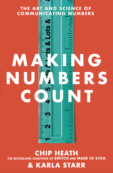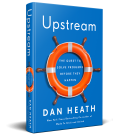Malcolm Gladwell’s new book, Outliers, was released today. Go get it at Amazon. (I’m not sure which I’ve had pre-ordered longer, Outliers or Season 4 of LOST, but it’s a close race.)
There’s a frustrating piece about Gladwell in New York Magazine in which his profiler seems determined to find something not to like about him. Within the first few paragraphs, the author manages to mention Gladwell’s car, his expensive leased parking place, his book advance, his speaking fees, and the fact that couriers come to pick up his New Yorker pieces, which is apparently intended to signal diva-hood. (I bet that fancy-pants Gladwell has someone else wash his car and do his taxes, too!)
Then the author dredges up what feels like every criticism ever made about Gladwell, including a four-year-old book review, published in The New Republic, that was critical of Blink. The piece reminded me of the discussions of “false equivalence” that were raging about political reporting this election cycle — i.e., the notion that you’ve got to report both sides of the story no matter how wrongheaded one side is. In this piece, it feels like Gladwell’s hundreds of thousands of fans and his dozens of critics are found deserving of equal attention.
But that’s a fan talking.



